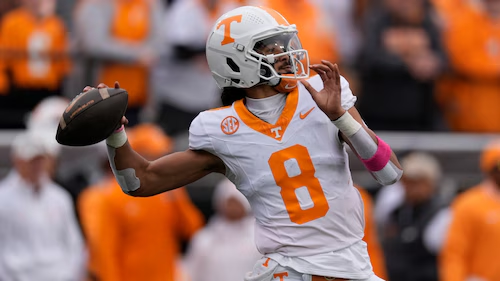
This situation surrounding Nico Iamaleava and Tennessee indeed paints a picture of the evolving and often turbulent landscape of college football in the NIL era. The clash between a highly-talented player seeking significant financial compensation and a program seemingly drawing a line in the sand highlights the complexities universities now face in managing player expectations and maintaining financial sustainability.
Let’s break down the key aspects of this unfolding drama:
The Core Conflict: NIL Expectations vs. Program Philosophy
The heart of the issue lies in the significant disparity between Iamaleava’s perceived market value and what the University of Tennessee (or its associated NIL collectives) is willing to provide. His reported desire for a $4 million annual NIL deal is a substantial figure, reflecting his potential as a high-profile quarterback. Tennessee’s apparent reluctance to meet this demand suggests a philosophical stance on NIL compensation within the program, potentially prioritizing a more balanced distribution of resources or adhering to a self-imposed cap.
Reactions and Interpretations:
-
Josh Heupel’s Firm Stance: Coach Heupel’s “nobody is bigger than the program” statement is a classic coaching mantra often employed to reinforce team unity and prioritize the collective over individual demands. While acknowledging Iamaleava’s contributions, his emphasis on moving forward signals a willingness to proceed with the players who are committed to the program’s structure and values. This stance could resonate with some fans who prioritize team loyalty and fiscal responsibility.
-
Tony Vitello’s Cryptic Remark: Coach Vitello’s “Bye Felicia” reference, while not directly addressing the NIL issue, carries a clear undertone of resignation and perhaps even a lack of surprise at Iamaleava’s potential departure. It suggests a sentiment that player movement driven by financial incentives is becoming a common, albeit perhaps unwelcome, aspect of the modern college sports landscape.
-
Kayla Nicole’s Endorsement: Kayla Nicole’s seemingly supportive tweet aligns with the program-first mentality echoed by Heupel. Her involvement adds an interesting layer of external commentary, potentially reflecting a broader sentiment among some observers regarding the financial dynamics of college sports.
-
Micah Parsons’ Traditionalist View: Micah Parsons’ criticism represents a more traditional viewpoint on college athletics, emphasizing the values of the sport beyond monetary gain. His comments highlight the ongoing debate about the impact of NIL on the amateurism and character development aspects of college sports. Many share his concern that the focus is shifting too heavily towards financial incentives.
Iamaleava’s Precarious Position:
Iamaleava, while possessing significant talent, now faces uncertainty. His pursuit of a lucrative NIL deal could lead him to a new program, but it also carries risks. Transferring involves adjusting to a new system, building new relationships, and potentially facing different levels of competition. The fact that some high-profile programs like Notre Dame and USC are reportedly not interested suggests that his high financial demands might be a deterrent for some.
Broader Implications for College Football:
This situation underscores the ongoing challenges and complexities of the NIL era:
- Managing Player Expectations: The influx of NIL money has created a new dynamic where highly-rated recruits and established players have significant financial expectations. Universities are grappling with how to meet these demands while maintaining budgetary control and team harmony.
- Potential for Instability: The allure of more lucrative NIL deals could lead to increased player movement and instability within programs, making long-term team building more challenging.
- Defining Player Value: Determining the “market value” of a college athlete is proving to be a difficult and often subjective process, leading to potential disagreements and situations like the one involving Iamaleava.
- The Role of Collectives: The reliance on external NIL collectives adds another layer of complexity, as universities often have limited direct control over the financial packages being offered.
Looking Ahead:
Iamaleava’s decision will be closely watched. His choice will not only impact his own career trajectory but could also serve as a significant case study in the ongoing negotiation between player financial aspirations and program financial realities in the NIL era. The reactions from coaches and observers highlight the diverse perspectives and evolving norms within college football as it navigates this new frontier.
Be the first to comment